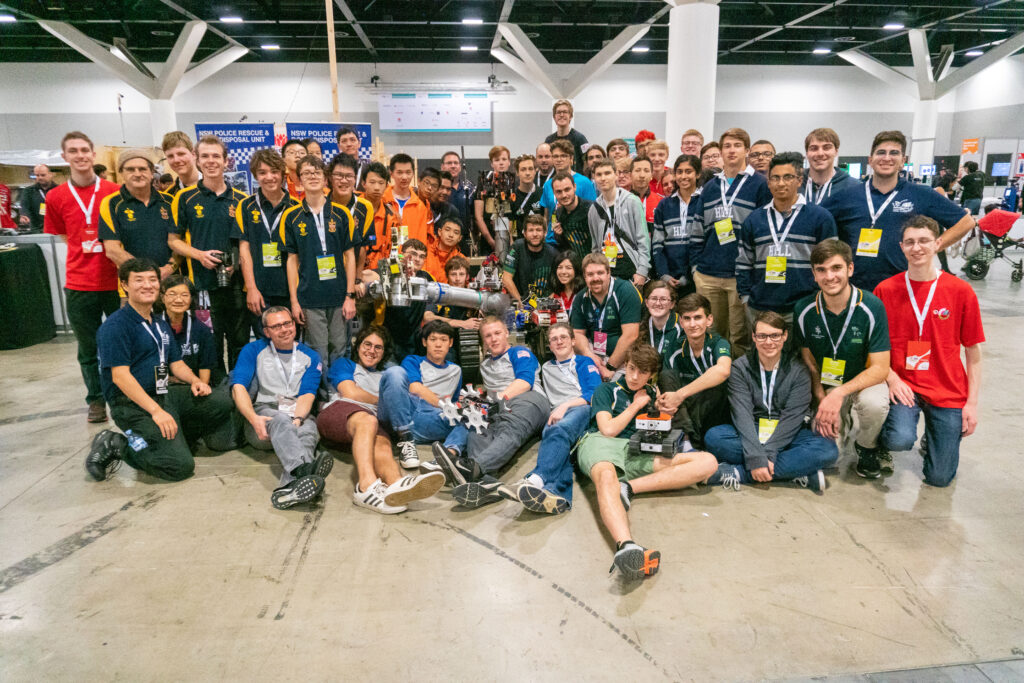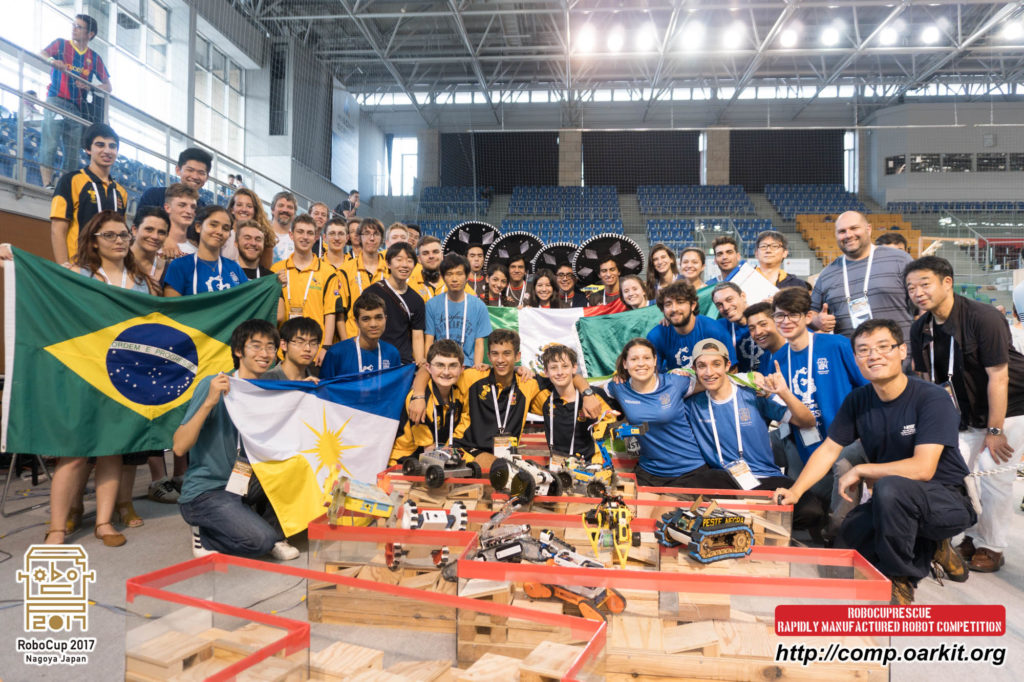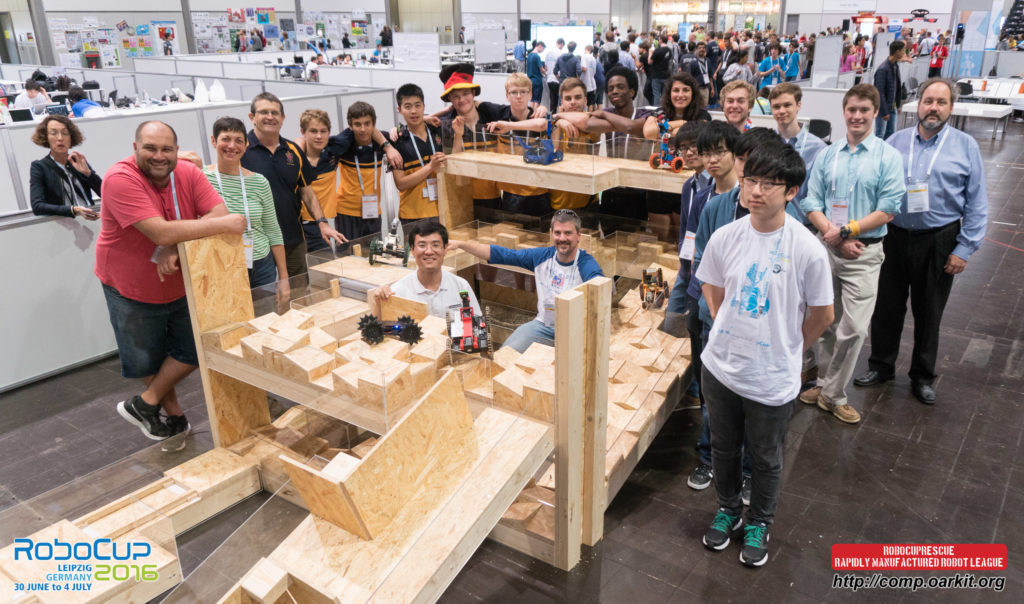Welcome to the RoboCupRescue Robot League’s Rapidly Manufactured Robot Challenge!
We are in the process of migrating information to our new page, https://rrl-rmrc.org/ ! Please check there for the latest info. This page will stay up for historical context and for information that we haven’t moved across yet.
(Formerly known as the Confined Space Challenge and the Mini Arena.)
Direct link to the Rules Development Page for the 2023 German Open.
RoboCupRescue is a research competition that encourages students to develop innovative solutions to open response robotics problems in Search and Rescue, Hazardous Materials Response, Explosive Ordnance Disposal and Tactical Reconnaissance.
The Confined Space Robotics Challenge brings this competition to the high school and undergraduate classroom. It focuses on the challenges of robots operating in confined spaces and makes use of recent advances in low cost rapid prototyping, electronics and sensors to lower the barrier of entry into robotics research.
The Challenge:
A wide variety of challenges face response robots operating in confined spaces. This competition encourages teams to develop solutions to problems that include driving over rough terrain, sensing the environment, picking up and delivering objects, intuitive operator control and autonomous behaviours. Solutions to these challenges will be highly interdisciplinary, covering mechanics, electronics, computing and art. The competition is structured so as to reward teams that do well overall, as well as teams that demonstrate innovative advances in specific challenges.
The Community:
The RoboCupRescue Robot League is an international community of teams from all over the world. Administered by the US Department of Commerce National Institute of Standards and Technology, in collaboration with an international committee of organisers, this community uses competitions and teaching camps to advance the state of the art in response robotics. Alumni of this competition include the Quince robots that were crucial in the response to the Fukushima Dai-ichi Nuclear Power Plant disaster.
The Robots:
A major component of this competition is the sharing of developments between teams and the wider community. While robots may be constructed using any method, including construction kits such as Lego and Vex, teams are encouraged to consider adopting the Open Academic Robot Kit. This
family of low cost, 3D printed robot designs allows teams from around the world, from high school through to PhD level, to share their innovations.
The Arena and Competition:
The area is designed to be easy to construct from parts available in any hardware and construction store and the tools available in a high school workshop. It is designed to be small and easy to stack for classroom use and storage. Details of how to build the arena are available by following the links in the upper menu of this page.
Quick Links:
- 2023 Competition, Bordeaux, France:
 The RoboCup 2023 Rapidly Manufactured Robot Challenge will be held entirely in-person, from the 4th to the 11th of July in Bordeaux, France! Please see this page for the details!
The RoboCup 2023 Rapidly Manufactured Robot Challenge will be held entirely in-person, from the 4th to the 11th of July in Bordeaux, France! Please see this page for the details!
- 2022 Competition, Bangkok, Thailand and Online:
- The RoboCup 2022 Rapidly Manufactured Robot Challenge will be held in hybrid form, with online and in-person competition options! Please see this page for the details!
- 2021 Competition, Online:
- RoboCup 2021 was held online, remotely. Please see the archives of the forum at https://rrl.forum.robocup.org/ and the mailing list at http://group.rrl-rmrc.org/ for the details!
- 2020 Competition, cancelled due to the pandemic:
- Team Participation Form HERE!
- Each team intending to participate in the World Championship must submit this by the 15th of Feb 2020.
- You may submit this form even if you’re not sure if you can come (funding, etc.).
- Teams that don’t submit this form by the 15th of Feb 2020 (eg. because they don’t find out about this competition until after this date) may be admitted if space is available but their notification of qualification may be delayed.
- We’re doing a major rules rewrite but all the procedural information from the 2019 competition will be broadly similar so teams can use those as a guideline.
- There will be some adjustment to the test methods/challenges and perhaps a few new ones inspired by our responder colleagues. Keep an eye on the MAILING LIST for updates!
- RoboCup 2020 main website HERE!
- Only in French right now, English version should be coming.
- Team Participation Form HERE!
- 2019 Competition, Sydney, Australia:
-
- OPENING ANNOUNCEMENT HERE!
- First-round qualified teams have been announced!
- Updated Team Description Papers from all participating teams are now available!
- The latest rulebook is available! See here for the latest version and associated proposed updates. Discuss updates at http://list.oarkit.org/ .
- We now have a Discord server! All students and mentors, current and prospective, are welcome to join us.
- 2018 Competition, Montreal, Canada:
-
- Announcement of Initial Rules and Qualification Process here.
- 2017 Competition, Nagoya, Japan:
-
- Initial qualification for the RoboCupRescue RMRC at the RoboCup Asia Pacific 2017 Super Regional competition in Bangkok, Thailand here. Deadline 25 September!
- Report from RoboCup 2017 in Nagoya here.
- Photos from the World Championship in Nagoya are available here.
- Announcement of Initial Rules and Qualification Process here.
- 2017 advertising flyer.
- 2016 Competition, Leipzig, Germany:
- Report from RoboCup 2016 in Leipzig here.
- Latest flyer outlining the competition is available here (PDF).
- Latest rules document is available here (PDF).
- Build instructions for the arena in which the competition is held are available here.
- Major competition rules version 1.1 are available here (PDF).
- Want to build your own robot? Start here, download or buy the lasercut parts from the links here.
- Forum for discussing this competition is here.
The Rules:
Being a demo competition in 2016, the rules are still being worked out (and indeed, will change during the competition as we discover better ways of running things). We will be based on the rules for the Major competition, available here.
- Robots may be autonomous (no operator) or remotely controlled. Operators must be out of sight of the arena and so can only see through the robot’s sensors. All radio transmissions must be 802.11a (preferred) or 802.11b/g/n.
- Teams deploy their robots in the arena and collect points for completing the different challenges within the allowed time. This enables teams that focus on specific challenges to compete against teams that demonstrate general proficiency across the various challenges
- Teams may practice in the arena before the competition and are encouraged to build their own versions of the arenas for practice.
- Further rule details will appear shortly!




